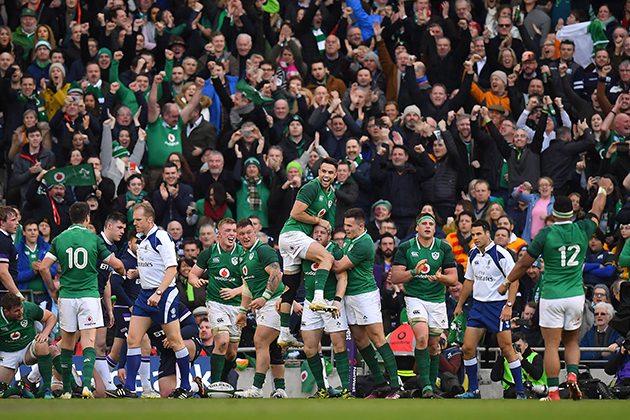With the Six Nations title decided a week early, has the introduction of bonus points diluted the excitement of the championship?
Have bonus points ruined the Six Nations?
Ever since the 2018 Six Nations fixtures were announced, there was talk of Grand Slam decider at Twickenham on St Patrick’s Day in the final round. Instead, Ireland have wrapped up the title a week early as they sit nine points clear at the top of the table.
Even if England had scored a second try late on and beaten France in Paris, rather than lost 22-16, they would not have been able to make it a title decider as their failure to get a try bonus point would have meant Ireland still sat six points clear.
CONFIRMATION: @IrishRugby's victory secures the 2018 #NatWest6Nations title. They will play for the Grand Slam next Saturday at Twickenham.
Full table ? https://t.co/D9K06pf0gm pic.twitter.com/IH5J0Ef73G
— NatWest 6 Nations (@SixNationsRugby) March 10, 2018
Now the big question that will be answered next Saturday at Twickenham is whether Ireland can win only the third Grand Slam in their history by beating England.
Related: What is a Grand Slam?
All this has led to the Six Nations bonus-point system being questioned. Has the introduction of bonus points for scoring four tries or finishing within seven points diluted the excitement of the championship?
The way the results have fallen in this penultimate round, even if there hadn’t been bonus points, the title would have already been decided as Ireland would sit on eight points with England on four.
Yet would England have performed better had they not had the pressure of needing to score four tries against France and instead simply needed to win?
That’s something we will never know.

Over time: Jonny May scores England’s only try late on against France (Getty Images)
It is also worth mentioning that the fact Ireland had three successive home games in this championship was probably more of a factor in them securing the title a week early than the bonus-point system.
And we should remind people that there wasn’t this clamour around bonus points and last-day drama 12 months ago, even though England went to Dublin for the final game with the title already secured.
So have bonus points ruined the Six Nations? That’s a stretch too far, ruin too strong a word. But it would be fair to ask: are they needed in the Six Nations?
Bonus points are designed to encourage teams to play attacking rugby and score tries as well as create a desire for teams to chase a game even if they are behind and go in search of that seven-point losing margin.
Related: Six Nations bonus points explained
Yet last year, the first year bonus points came into play, fewer tries were scored than in 2016 – 66 to 71. So teams can play in an attacking style even without the added incentive of an extra point for crossing the line four times.
And one thing we will most likely never see again should bonus points become permanent in the Six Nations – as chief executive John Feehan intimated they would earlier this year – is a three-way title decider on the final day, as we witnessed in 2015.

High drama: Ireland fans react to the England v France result on Super Saturday in 2015 (Getty Images)
Three years ago Super Saturday presented unrivalled drama with England, Ireland and Wales in the title mix – and it all came down to points difference. With four wins apiece, it was Ireland – despite scoring eight tries to England’s 18 across the championship – who lifted the trophy, with a points difference that was just six better than England’s.
That was one of the great days in championship history and may never be repeated should bonus points remain. That alone is a good argument to dispense with them in this so special of tournaments.
Be sure to follow Rugby World on Facebook, Twitter and Instagram.






